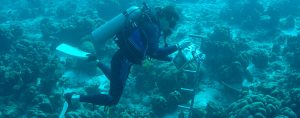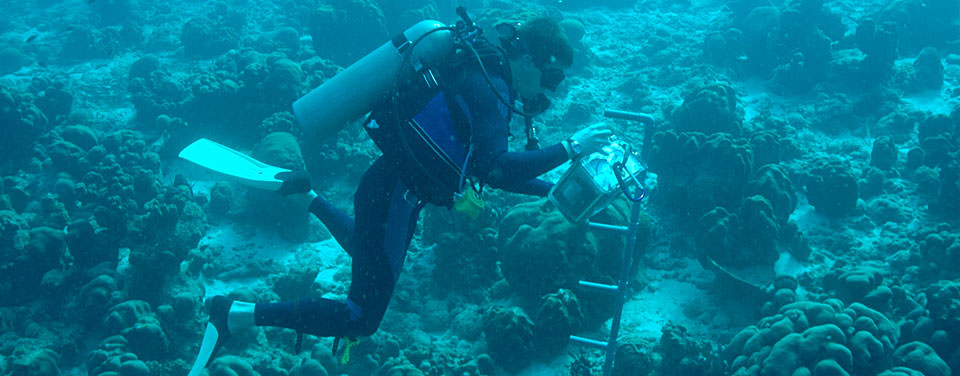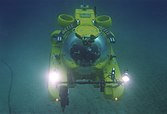Marine science or Aquatic science is the study of the various bodies of water that make up our planet, including oceanic and freshwater environments. In simple words, Marine Science is the study of the sea and its inhabitants. As a Marine Science major, you’ll consume a wide variety of subjects to augment your understanding of this field: biology, chemistry, geology, and physics are only a few of the disciplines that will be incorporated into your studies. Aquatic scientists study the movement of water, the chemistry of water, aquatic organisms, aquatic ecosystems, the movement of materials in and out of aquatic ecosystems, and the use of water by humans, among other things. Aquatic scientists examine current and historical processes, and the water bodies they study can range from tiny areas measured in millimetres to full oceans. Moreover, aquatic scientists work in Interdisciplinary groups. For example, a physical oceanographer might work with a biological oceanographer to understand how physical processes, such as tropical cyclones or rip currents affect organisms in the Atlantic Ocean. Chemists and biologists, on the other hand, might work together to see how the chemical makeup of a certain body of water affects the plants and animals that reside there. Aquatic scientists can work to tackle global problems such as global oceanic change and local problems, such as trying to understand why a drinking water supply in a certain area is polluted.
Marine science is a rich discipline that combines studies from various subjects to understand the marine environment, marine life, and their interactions.
Two main fields of study fall within the field of aquatic science. These fields of study include oceanography and limnology.
Oceanography
Oceanography refers to the study of the physical, chemical, and biological characteristics of oceanic environments. Oceanographers study the planet’s oceans’ history, current condition, and future. They also study marine life and ecosystems, ocean circulation, plate tectonics, the geology of the seafloor, and the chemical and physical properties of the ocean.
Oceanography is interdisciplinary. For example, there are biological oceanographers and marine biologists. These scientists specialize in marine organisms. They study how these organisms develop, their relationship with one another, and how they interact and adapt to their environment. Biological oceanographers and marine biologists often utilize field observations, computer models, laboratory experiments, or field experiments for their research. In the field of oceanography, there are also chemical oceanographers and marine chemists. These scientists’ areas of focus are the composition of seawater. They study the processes and cycles of seawater, as well as how seawater chemically interacts with the atmosphere and seafloor. Some examples of jobs that chemical oceanographers and marine chemists perform are analyzing seawater components, exploring the effects pollutants have on seawater, and analyzing the effects of chemical processes on marine animals. In addition, a chemical oceanographer might use chemistry to better understand how ocean currents move seawater and how the ocean affects the climate. They might also search for ocean resources that could be beneficial, such as products that have medicinal properties.
The field of oceanography also consists of geological oceanographers and marine geologists who study the ocean floor and how its mountains, canyons, and valleys were formed. Geological oceanographers and marine geologists use sampling to examine the history of sea-floor spreading, plate tectonics, thermohaline circulation, and climates. In addition, they study undersea volcanos, mantle (geology), and hydrothermal circulation. Their research helps us to better understand the events that led to the creation of oceanic basins and how the ocean interacts with the seabed. Lastly, under the field of oceanography, there are physical oceanographers. Physical oceanographers are experts on the physical conditions and processes that occur naturally in the ocean. These include waves, currents, eddies, gyres, tides, and coastal erosion. Physical oceanographers also study topics such as the transmission of light and sound through water and the ocean’s effects on weather and climate. All of these fields are intertwined. To succeed in their field, an oceanographer needs to understand other related sciences, such as biology, chemistry, and physics.
Limnology
Limnology studies freshwater environments, such as rivers, streams, lakes, reservoirs, groundwater, and marshlands. Limnologists work to understand the various natural and man-made factors that affect our natural water bodies, such as pesticides, temperature, runoff, and aquatic life. For example, a limnologist might study the effects of pesticides on the temperature of a lake, or they might seek to understand why a certain species of fish in the Nile River is declining.
In order to increase their understanding of what they are studying, limnologists employ three main study techniques. The first study technique has to do with observations. Limnologists make descriptive observations of conditions and note how those conditions have changed over time. These observations allow limnologists to form theories and hypotheses. The second study technique that limnologists use has to do with experimentation. Limnologists conduct controlled experiments under laboratory conditions to further their understanding of the impact of small, individual changes in the ecosystem. Lastly, limnologists come up with predictions. After they have conducted their experiments, they can apply what they have learned to known data about the wider ecosystem and make predictions about the natural environment.
Within the field of limnology, there are more specific areas of study. One of those areas of study is ecology, particularly the ecology of water systems. The ecology of water systems focuses on the organisms that live in freshwater environments and how they are affected by changes in their habitat. For example, a limnologist specializing in ecology could study how chemical or temperature changes in a body of water inhibit or support new organic growth. Another aspect they may examine is the effects of a nonnative species on native populations of aquatic life. Most ecological limnologists conduct their studies in laboratory settings, where their hypotheses can be tested, verified, and controlled. Another area of study under limnology is biology. Limnologists who specialize in the biology field only study the living aquatic organisms that are present in a certain freshwater environment. They aim to understand various aspects of the organisms, such as their history, life cycles, and populations. These scientists study living organisms to support the proper management of fresh bodies of water and their ecosystems.

credit: oceanservice.noaa.gov
Studying Marine Science
Marine science is a rich discipline that combines studies from various subjects to understand the marine environment, marine life, and their interactions. Basic biology, chemistry, geology, mathematics, and physics knowledge is essential for students to analyze marine systems’ workings and appreciate the processes affecting marine life. Studies in marine biology are broad, spanning organisms from bacteria to whales and perspectives from entire marine communities to the biochemistry of molecules. Marine science plays a pivotal role in the quest to understand our world and manage its resources. The interdisciplinary nature of the Marine Science curriculum will prepare students to analyze critically such contemporary issues as environmental change, human impacts on the ocean, and biodiversity.
Students seeking the BS degree in Marine Science can complete the degree without a concentration, or they may select one of three concentrations: marine biology, oceanography, or aquaculture. The biological concentration emphasizes ecology, behaviour, physiology, genetics, and population and community structure of marine animals, plants, and microbes. The oceanography concentration is oriented toward physical, chemical, and geological ocean science. The aquaculture concentration focuses on the biology, nutrition, and production of finfish and shellfish. Students also learn about aquaculture engineering and the economic issues related to aquaculture. Students in each concentration learn to appreciate the oceanographic perspective, that is, the oceans as systems of interacting components. Each concentration shares common courses designed to provide an interdisciplinary science background. Courses utilise the many ecological and oceanographic regimes found along the Maine coast. Students in the Marine Science program are provided with a solid general foundation in the sciences suitable for advanced study in one of the marine sciences or other scientific fields. The BS in Marine Science also provides a solid preparation for immediate employment in marine-related industries, governmental agencies, education, and the nonprofit sector. Students may consult with their academic advisors to achieve specific goals, such as professional certification as an Associate Fisheries Scientist by the American Fisheries Society.
Many marine scientists will tell you that they work in this field out of sheer passion and a love for the sea rather than a huge salary. That being said, the career prospects are very good in some of the marine science fields, such as marine engineering and marine geology, which offer higher salaries. As a marine scientist, you’ll analyse the sea and its interaction with the land, atmosphere, sea floors, animal life and plants, and use the information gained to predict changes to the earth’s infrastructure, inform statutory legislation and encourage environmental protection.
Oceanography is the interdisciplinary study of the global oceans—from shallow coastal areas to the deepest ocean trenches, from the tropics to the polar seas. It’s typically divided into four sub-disciplines:
- physical oceanography (the study of waves, currents, tides and ocean energy);
- geological oceanography (the study of the sediments, rocks and structure of the seafloor and coastal margins);
- chemical oceanography (the study of the composition and properties of seawater and how it is affected by physical mixing processes and interactions with the seafloor, the atmosphere and ocean life); and
- biological oceanography (the study of marine organisms and their interactions with the ocean environment).
These sub-disciplines are interrelated and closely aligned to other fields such as meteorology/atmospheric science, geophysics and ocean engineering. Biological oceanography shares many aspects with marine biology but is generally more focused on the interactions of specific parameters within the marine environment. A biological oceanographer pays particular attention to the effects of the ocean’s chemical, physical or geographic properties and how these affect the distribution and abundance of marine organisms in the sea.
What can you do with an oceanography degree?
A Bachelor of Science in Oceanography provides a strong academic foundation in the physical and biological sciences, including additional preparation in understanding marine systems. You’ll be prepared for an entry-level marine/aquatic science position in a government agency helping to establish marine policy or performing fisheries management; in a research setting as a field or data technician; or in a non-profit or education setting, to name a few. Because the number of students who pursue oceanography is relatively small, many unique opportunities exist. If you choose to specialize further or go on to a career in direct research, you’ll have the academic foundation necessary to pursue a master’s or doctoral degree in your chosen field.
Marine Biologist Salary
In 2022, according to comparably.com, the salaries of Marine Biologists in the US range from $13,292 to $356,999, with a median salary of $64,435 .
References:
- Wikipedia
- IMO
- https://www.comparably.com/salaries/salaries-for-marine-biologist
- https://www.princetonreview.com/college-majors/164/marine-science
- http://www.marinesciencegroup.org/?lang=en
- https://oceanservice.noaa.gov/facts/oceanographer.html






Your article helped me a lot, is there any more related content? Thanks!